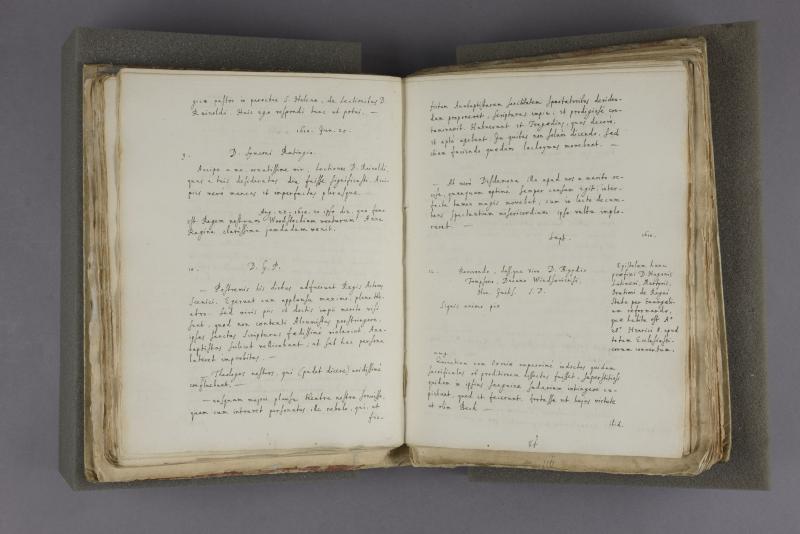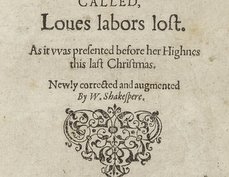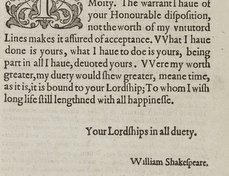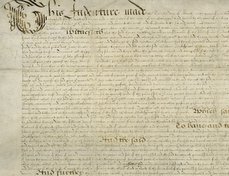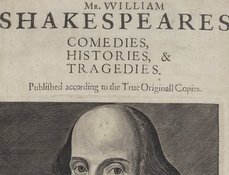By permission of the President and Fellows of Corpus Christi College, Oxford.
Terms of use
Corpus Christi College, Oxford, has graciously contributed the above image from their collections to Shakespeare Documented, and retains sole ownership of said image. Visitors may download, link to and cite the image within Shakespeare Documented in personal research only. Any further use, including, but not limited to, unauthorized downloading or distribution of the image is strictly prohibited. Permission for any other use must be sought in advance from Corpus Christi College, Oxford at library.staff@ccc.ox.ac.uk.
Document-specific information
Creator: William Fulman
Repository: Corpus Christi College, Oxford, Oxford, UK
Call number and opening: MS 304, fol. 83v - 84r
In September 1610, Henry Jackson (1586-1662) of Corpus Christi College, Oxford, wrote a letter in Latin to his friend “G.P.” in which he described a recent visit by Shakespeare’s company, the King’s Men. The actors performed Ben Jonson’s The Alchemist, Shakespeare’s Othello, and other tragedies. The original letter no longer survives, but a slightly later version does. The antiquary William Fulman (1632-88) made extracts from it and other letters by Jackson in a notebook now preserved at Corpus Christi.
The four extracts each mention different aspects of the visit. In the first extract, Jackson notes that the King’s Men had recently performed to full houses and great applause. Referring to Ben Jonson’s The Alchemist, Jackson observes that the actors
justly struck pious and learned men as impious, because, not content to hit at the alchemists, they most foully besmirched Holy Writ itself. That is, they taunted the Anabaptists, as if improbity hid behind this mask.
Jackson clearly counts himself among the “pious and learned men” who took umbrage at the lampoon of Puritans in The Alchemist, in the figure of Tribulation, and was offended by the play’s Biblical allusions. This theatrical burlesque of hypocritical Puritans may have hit uncomfortably close to home: several University comedies, after all, dealt in the same brand of humor and were probably meant to make the more straight-laced members of the academic community uncomfortable.
In the second extract he reports with evident disgust -- “I am ashamed to say” -- that clergymen flocked to the performances as eagerly as anybody else.
In the third extract, Jackson notes that the greatest applause in The Alchemist happened “when that hypocritical buffoon made his entrance, who, to hold up the false sanctity of the Anabaptists before the spectators as an object of derision, impiously and monstrously sullied Scripture.” Jackson then compliments the actors for performing the tragedies “with decorum and fitness,” mentioning that they “elicited tears not only with their speaking but also with their physical action.”
In the fourth extract, Jackson observes that Desdemona’s performance (in Othello) was particularly moving: “But that Desdemona, murdered by her husband in our presence, although she always plead her case excellently, yet when killed moved us more, while stretched out on her bed she begged the spectators’ pity with her very facial expression.”
University men were not supposed to attend professional performances, but Jackson’s reference to a full house suggests that plenty attended. In all likelihood the plays were performed at the town hall, since the King’s Men were hired by the municipal government (see Records of Early English Drama: Oxford, II.615).
Shakespeare was no stranger to Oxford. The title page of the first edition of Hamlet in 1603 refers to performances at “the two vniuersities of Cambridge and Oxford” in addition to London, “and else-where.” Records of Early English Drama cites evidence for an earlier visit from the King’s Men on August 5, 1605 (REED, X.x). Jackson’s account of the visit by the King’s Men corresponds with the supposition that they visited Oxford in August 1610 (see E. K. Chambers’ itinerary of the King’s Men published in The Elizabethan Stage: III.371).
Jackson is best known for preparing several manuscript works by Richard Hooker for publication. The recipient of his letter, “D[ominus?] G.P.,” has not yet been identified. In a June 1610 letter also extracted by Fulman, the recipient is identified as “Amico s[uo?] G.P.” Geoffrey Tillotson’s commentary on the letter in the Times Literary Supplement (Thursday, July 30, 1933, p. 494) suggests that it may have been George de St. Paul, a benefactor of Corpus Christi College who died in 1613.
Fulman was a Fellow of Corpus Christi College who succeeded Jackson as rector of Meysey Hampton (a living controlled by the College) in 1669. Fulman copied out and collected thousands of pages of historical and literary texts and correspondence from the Elizabethan and Jacobean periods, including, beginning in ca. 1670, biographical notices of eminent English poets. He bequeathed his large collection of papers to Mr. Richard Davies at his death in 1688, and in ca. 1690, Davies filled in Fulman’s blank entry for Shakespeare with the apocryphal story about Shakespeare’s poaching of deer and rabbits. When Davies died in 1707, the antiquary Anthony Wood gave the Fulman and Davies papers to Corpus Christi College.
These last few days the King's stage-players have been here. They have acted with the greatest applause, with the theater full. But they justly struck pious and learned men as impious, because, not content to hit at the alchemists, they most foully besmirched Holy Writ itself. That is, they taunted the Anabaptists, as if improbity hid behind this mask.
Our clergymen, who (I am ashamed to say) most eagerly gathered together…
…our theater never rang with greater applause than when that hypocritical buffoon made his entrance, who, to hold up the false sanctity of the Anabaptists before the spectators as an object of derision, impiously and monstrously sullied Scripture. They also had tragedies, which they acted with decorum and fitness. In these they elicited tears not only with their speaking but also with their physical action.
But that Desdemona, murdered by her husband in our presence, although she always pled her case excellently, yet when killed moved us more, while stretched out on her bed she begged the spectators’ pity with her very facial expression.
Sept. 1610.
[folio 83 verso]
-Postremis his diebus adfuerunt Regis Actores
Scenici. Egerunt cum applausu maximo, pleno the-
atro. Sed viris piis et doctis impii merito visi
sunt, quod non contenti Alcumistas perstringere,
ipsas sanctas Scripturas foedissime violarint. Ana-
baptistas scilicet vellicabant; ut sub hac persona
lateret improbitas.
-Theologos nostros, qui (pudet dicere) avidissime
confluebant.
-nusquam maiori plausu theatra nostra sonuisse,
quam cum intraret personatus ille nebulo, qui, ut
[folio 84 recto]
fictam Anabaptistarum sanctitatem spectatoribus deriden-
dam proponeret, scripturas impie, et prodigiose con-
taminavit. Habuerunt et Tragoedias, quas decore,
et apte agebant. In quibus non solum dicendo, sed
etiam faciendo quaedam lachrymas movebant.-
At vero Desdemona ilia apud nos a marito oc-
cisa, quanquam optime semper causam egit, inter-
fecta tamen magis movebat; cum in lecto decum-
bens spectantium misericordiam ipso vultu implor-
aret.
Sept. 1610.
Content adapted by Folger Shakespeare Library staff with permission from Dana F. Sutton, “Henry Jackson, Letter of September 1610.”
Translations by Dana F. Sutton.
Sources
Catalogue of English Literary manuscripts 1450-1700, “Corpus Christi College, Oxford”
<celm-ms.org.uk/repositories/corpus-christi-college-oxford.htmlhttp://www.celm-ms.org.uk/repositories/corpus-christi-college-oxford.html>
E. K. Chambers, The Elizabethan Stage (Oxford: Clarendon Press, 1923): III.371.
John R. Elliott et al., Records of Early English Drama: Oxford (Toronto, 2004) II.615
Daniel Eppley, “Jackson, Henry (1585/6–1662),” Oxford Dictionary of National Biography (Oxford University Press, 2004) <oxforddnb.com/view/article/14526>
Joseph Foster, Alumni Oxonienses (repr. Nendeln, 1968): II.794.
Park Honan, Shakespeare, A Life (Oxford, 1998): 225f.
The National Archives. “Fulman, William (1632-1688) Antiquary” <discovery.nationalarchives.gov.uk/details/c/F67675>
Peter Sherlock, “Fulman, William (1632–1688),” Oxford Dictionary of National Biography (Oxford University Press, 2004) <oxforddnb.com/view/article/10244>
Dana F. Sutton “Shakespeare and the Academics,” Neulateinisches Jahrbuch 3 (2001): 177 – 186.
Dana F. Sutton “Henry Jackson, Letter of September 1610” The Philological Museum <philological.bham.ac.uk/jackson/intro.html>
Geoffrey Tillotson, Times Literary Supplement (Thursday, July 30, 1933): 494.
Martin Wiggins, “The King’s Men and After,” in Jonathan Bate and Russell Jackson, eds. Shakespeare: An Illustrated Stage History (Oxford, 1996): 32f.
Edmond Malone et al., The Plays and Poems of William Shakspeare (London, 1821): 122.
Last updated February 8, 2020

